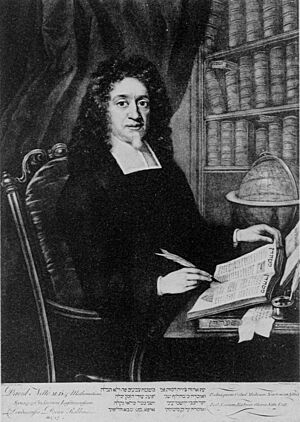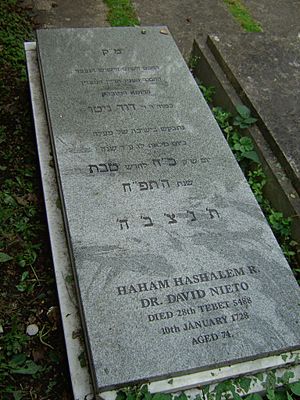David Nieto facts for kids
David Nieto (born 1654, died 1728) was a very important Jewish leader and scholar. He served as the chief rabbi, called a Haham, for the Spanish and Portuguese Jewish community in London. His son, Isaac Nieto, later took over this important role.
Contents
Early Life and Studies
David Nieto was born in Venice, a famous city in Italy. Before becoming a rabbi, he worked as a doctor. He also served as a Jewish preacher in Livorno, another city in Italy.
While in Livorno, he wrote a book in Italian called "Paschologia" (published in 1702). In this book, he discussed how different calendars were calculated. He looked at the calendars used by Greek, Roman, and Jewish religious groups. He also pointed out mistakes that had appeared in the calendar over many years.
Moving to London and New Ideas
In 1702, David Nieto moved to London. He became the new chief rabbi for the Portuguese Jewish community there. Two years later, he published another important book called Della Divina Providencia, ó sea Naturalezza Universal, ó Natura Naturante (1704).
In this book, Nieto explained that what people call 'nature' is actually God's way of managing everything in the world. This idea caused some disagreement. Some people accused him of believing in Spinozism, which was seen as a form of atheism (not believing in God). However, it was believed that some of his accusers were actually followers of a controversial figure named Shabbetai Zevi.
To settle the argument, a respected rabbi named Tzvi Ashkenazi was asked to decide. Rabbi Ashkenazi supported David Nieto, saying his teachings were correct and praising him highly. Another famous rabbi, Chaim Joseph David Azulai, also spoke highly of Nieto. David Nieto lived in London until he passed away. He is buried in the Old Jewish Cemetery in Mile End Road.
Defending Jewish Beliefs
David Nieto was known for being a strong debater. He wrote a book called Matteh Dan, or Kuzari Heleq Sheni (1714). This book was written in both Hebrew and Spanish. It was inspired by an older famous book called the Kuzari.
In Matteh Dan, Nieto defended the Oral Torah. The Oral Torah is a collection of Jewish laws and traditions passed down by word of mouth. He argued against groups like the Karaites, who only followed the written Torah. Nieto showed that disagreements in the Talmud (a central text of Rabbinic Judaism) were about small details, not major laws.
He also strongly opposed the followers of Shabbetai Zevi, who had controversial beliefs. Nieto felt these ideas were harmful to Judaism. He wrote another book, Esh Dat (1715), specifically against a supporter of Shabbetai Zevi named Hayyun.
A Man of Many Talents
David Nieto was one of the most talented Jewish scholars of his time. He was skilled in many different areas, including:
- Philosophy (thinking about big ideas)
- Medicine (being a doctor)
- Poetry (writing poems)
- Mathematics (working with numbers)
- Astronomy (studying stars and planets)
- Theology (studying religion)
He wrote many books and was in touch with many Christian scholars, especially a bibliographer (someone who studies books) named Ungar. David Nieto was also the first person to accurately determine the correct time for the start of the Sabbath eve in England.
Translations
 | Anna J. Cooper |
 | Mary McLeod Bethune |
 | Lillie Mae Bradford |



